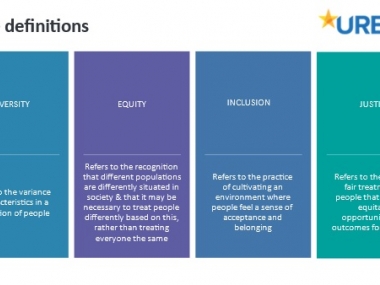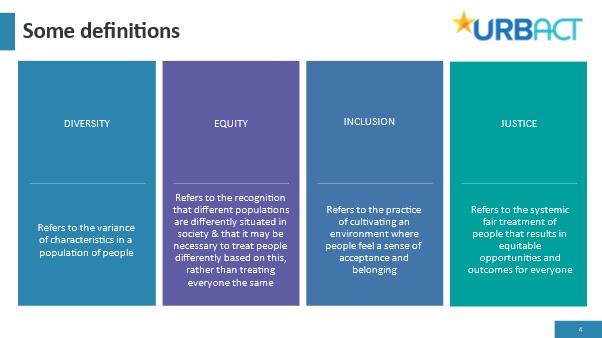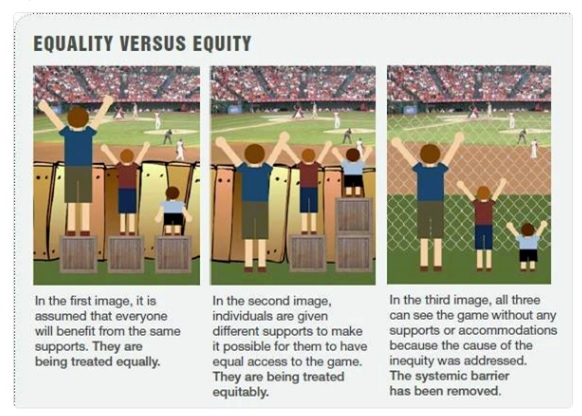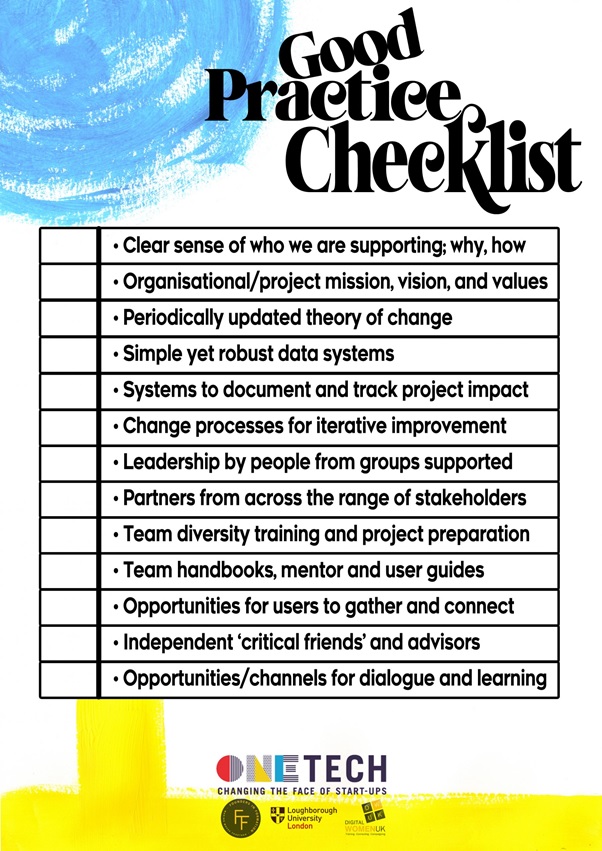The value of Diversity, Equity and Inclusion for local economies
Edited on
04 January 2022If I could write the perfect title for a presentation, this one would be right up there so I was delighted to be invited to lead a policy webinar on this topic earlier in the Autumn for the URBACT IPlace Action Planning Network.

With this piece I share some of my reflections from planning and delivering this session. Taking my lead from the structure of the webinar, I will briefly consider:
• The difference between diversity, equity, inclusion and justice;
• Why it matters for local economies;
• What cities can do to help.
I will then finish with some more personal reflections around how to begin the conversation locally and why, in my opinion, using the wider diversity and inclusion lens is a good place to start when it comes to local urban economies.
What is the difference between Diversity, Equity and Inclusion?
I notice more and more that people use the terms Diversity, Equity and Inclusion pretty much interchangeably. Whilst, after a career of banging the drum about the importance of equality and inclusion, I am delighted that there is some momentum behind this topic across European cities, I do think it is important to distinguish between these terms. This helps us to address the different challenges they each bring. It may in turn also help us to take an incremental approach which starts to move the needle.

This slide shows the definitions I used in the webinar. They are taken from a range of different sources and written in a way that I hope is accessible for policy makers and practitioners working to support local economies in EU towns and cities. To bring this to life a bit more I used an image which was based on a sketch from 2012 by a US designer to illustrate why ‘equal opportunity’ alone is not enough and actually we need to consider equality of outcome. This image has been reproduced in many different guises over the past 10 years and, for me, is a really useful – if somewhat challenging - way of looking at the world!

So, equality of opportunity is simply not enough if we want to grow more inclusive local economies.
The principle of a fairer society is enshrined in the Leipzig Charter which calls for cities to develop just, green and productive urban systems. COVID-19 has further highlighted the ongoing structural inequalities in our societies with women and people of colour being worst affected across the EU.
Why does this matter when it comes to local economies?
I have worked in local economic development now for over 30 years and in the past decade have focused more and more on enabling and supporting inclusive digital economies. In 2018 I founded a Diversity in Tech programme called OneTech which has since supported nearly 2000 women and people of colour in London to connect with opportunities in tech entrepreneurship. Having led the 10-strong OneTech team until June 2021, the link between race, gender, class, education and social capital and successful business creation has never felt clearer. The statistics are particularly stark when it comes to raising investment:
The State of European Tech report (Atomico) noted that in 2020 gender diversity in European Tech stagnated with all men teams capturing 90.8% of all capital raised (90.3% in 2019) and 85% of all rounds. And only 16% of employees saw meaningful gender change in leadership teams over the previous year. The report concluded that ‘discrimination remains a system problem’.
And yet, according to a study by McKinsey that spans 15 countries and more than a thousand large companies, there is a strong relationship between diversity on executive teams and financial outperformance. In fact, the study showed that businesses with diverse leadership teams were likely to outperform their peers by up to 36%. Another study by Harvard Business Review shows that teams with inclusive leaders are 17% more likely to report high performance, 20% more likely to make high-quality decisions, and 29% more likely to work collaboratively. Businesses are more likely to have products and services which meet the needs of diverse local communities. Diversity breeds great innovation and creativity and a diverse workforce means a wider range of skills so businesses will be boosted.
And let’s also consider the cost of not addressing persistent inequalities – left unchecked this would lead to huge rifts in society and a drain on the public purse. So, economic and social inclusion are inextricably linked and business creation offers real potential for different communities to earn income and contribute to both societal and economic development.
In short, as well as being the right, just and fair thing to do, it’s also good for business.
But what can towns and cities do?
There are so many things that local economic development stakeholders can do to support diversity, equity and inclusion. Here I summarise a few under the main headings of policy, culture and action:
- POLICY – public policy can have an important role in making local economies for inclusive. For example, policies can address market, institutional and behavioural failures that tend to fall heavily on disadvantaged and under-represented groups. For the economy in particular, cities can refine local regulatory and welfare institutions to reduce barriers to business creation.
- CULTURE – city economic development practitioners can work with their wider economic stakeholders (perhaps through an URBACT Local Group) to build a culture that is supportive of business creation in diverse social groups. They can increase awareness about opportunities, benefits and practices of entrepreneurship / business ownership. They can share stories of people from diverse communities who are part of the local economic make up. They can use accessible language, messaging and imagery to help diverse communities see themselves in the makeup of the local economy. They can promote an accessible, open and business-friendly civic culture.
- ACTION – cities can support and / or directly deliver business development initiatives which enable underserved communities to connect with opportunities and high value networks. They can facilitate access to finance, including through loan guarantees or micro finance. They can offer additional support for communities seeking to start, sustain or scale businesses and provide coaching, training and mentoring.
During my work with OneTech we teamed up with a research team from the Innovation and Entrepreneurship Institute at Loughborough University led by the amazing Dr Angela Martinez Dy. Angela worked with us for 2 years to help us understand what was working, what was not and how to improve our services. She summarised some of her findings in this policy brief which ends with the good practice check list below:

In my opinion, this list has potential to be as useful for local economic development teams as it was for OneTech and our stakeholders. The policy brief itself – and the accompanying webinar-style video available at the link above – provide more background, hints and tips.
What next for Diversity, Equity and Inclusion in Local Economies
During the IPlace webinar, I told the story of Maya with a view to helping participants connect more with what can sometimes feel like a tricky and even sometimes alienating topic.
‘Mayo is a citizen of your city – she might not look exactly like this but she will be there. She is a 2nd generation migrant, is 23 years old and still lives with her parents. Her mum is a cleaner and her dad works in a local manufacturing plant but is constantly worried he’ll lose his job. Maya worked hard at school, is bright and was the first person in her family ever to go to university. There, she saw a different way of life and now she’s home she wants to start her own business and develop a positive economic future for herself and her family.
Maya faces a wide range of barriers, particularly around social capital and social class, when embarking upon her business journey. She has lots of good friends from university who seem to have walked into good jobs. It doesn’t feel very fair.
Maya has an incredible business idea but, because of choices she made at school, she will need a more technical co-founder to bring it to life. Her parents encouraged her to do business management and she thought that would be good enough but she now realises she would have been better studying engineering or computer science- pretty much any STEM subject really – like so many of her male peers.
In order to build a minimum viable product and test it she needs to find a technical co-founder and raise some finance. She has no idea where to start. Her friends from university tell her to ask family and friends as the amount she needs is ‘only’ €50,000 initially. Maya knows that there is absolutely no way she can get that sort of money from her own network. Also, she doesn’t know anyone with the skills or experience to build the MVP she knows she needs. Her dad suddenly loses his job so household finances become even tighter.
Maya needs your help…..If she is able to access some support at this vital stage of her business journey, she undoubtably has potential to grow an incredible business which will create high value jobs and opportunities for local people. It could even put your city on the map as somewhere progressive to start and grow a digital company.
What I observed, when I told Maya’s story, was how people on the call seemed to immediately feel more comfortable. We ended up having quite a candid conversation about how this can be an uncomfortable topic, particularly for people of privilege and especially for educated white men. It felt like many people really didn’t know where to start. I got the sense that it was more relateable to talk about the wider topic of diversity and inclusion than perhaps it is to focus purely gender equality. Of course, the many facets of this overall topic are not mutually exclusive, we need to look at this through an intersectional lens and there is no doubt that work is urgently needed across the piste to affect change. However, perhaps somewhat controversially, I was left with a sense that the EU – and other international - institutions’ primary focus on gender equality might in fact be a barrier to participation for some.
Perhaps a starting point for city practitioners would be to map and then work with local underserved communities and the grassroots groups that support them. I would put money on these communities and groups existing in each and every city in Europe. The municipality may not be aware of them but they will be there. Finding them means reaching out to the places and spaces where they spend time – both on and off-line. So, my advice as a starting point would be to ‘find your Maya’; Actively listen to the communities you are wishing to target. User Angela’s checklist as a way of co-creating support activities. Be prepared to – indeed embrace – discomfort. Be prepared to change the way you do business. Rest assured that diversifying your local economy and enabling a more just economy for all will, in time, contribute to local economic development.
And remember…
‘Diversity without changing the structure simply brings those who were previously excluded into a process that continues to be as harmful as it was before.’
Angela Davis
Alison Partridge
URBACT Expert
October 2021
alison@aurora-ltd.eu
 Submitted by Sonia Files on
Submitted by Sonia Files on
